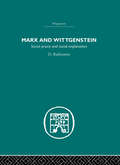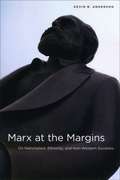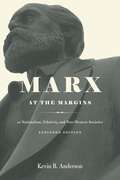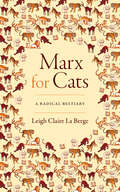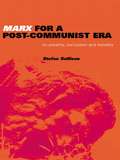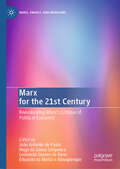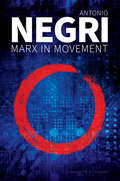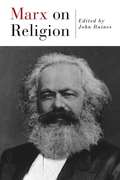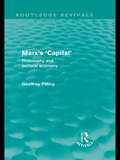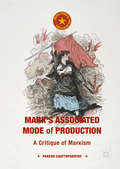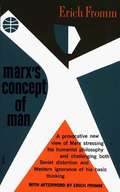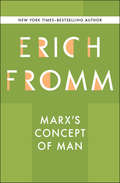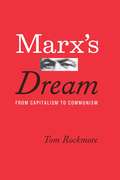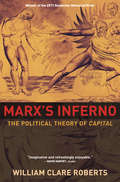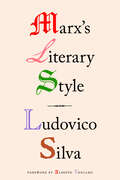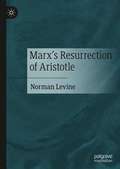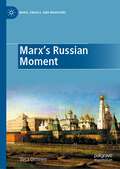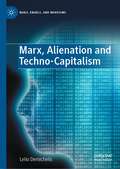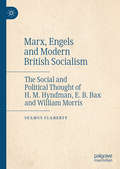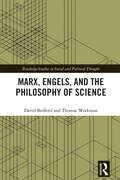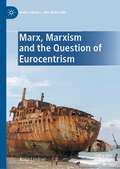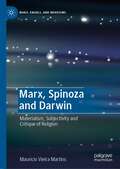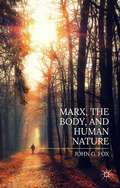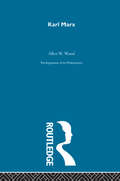- Table View
- List View
Marx and Wittgenstein: Social Praxis and Social Explanation
by D. RubinsteinFirst published in 2005. Routledge is an imprint of Taylor & Francis, an informa company.
Marx at the Margins: On Nationalism, Ethnicity, and Non-Western Societies
by Kevin B. AndersonAnalyzing a variety of Marx's writings, including journalistic work written for the New York Tribune, Anderson presents us with a Marx quite at odds with our conventional interpretations.
Marx at the Margins: On Nationalism, Ethnicity, and Non-Western Societies
by Kevin B. AndersonIn Marx at the Margins, Kevin Anderson uncovers a variety of extensive but neglected texts by Marx that cast what we thought we knew about his work in a startlingly different light. Analyzing a variety of Marx’s writings, including journalistic work written for the New York Tribune, Anderson presents us with a Marx quite at odds with conventional interpretations. Rather than providing us with an account of Marx as an exclusively class-based thinker, Anderson here offers a portrait of Marx for the twenty-first century: a global theorist whose social critique was sensitive to the varieties of human social and historical development, including not just class, but nationalism, race, and ethnicity, as well. Through highly informed readings of work ranging from Marx’s unpublished 1879–82 notebooks to his passionate writings about the antislavery cause in the United States, this volume delivers a groundbreaking and canon-changing vision of Karl Marx that is sure to provoke lively debate in Marxist scholarship and beyond. For this expanded edition, Anderson has written a new preface that discusses the additional 1879–82 notebook material, as well as the influence of the Russian-American philosopher Raya Dunayevskaya on his thinking.
Marx for Cats: A Radical Bestiary
by Leigh Claire La BergeAt the outset of Marx for Cats, Leigh Claire La Berge declares that “all history is the history of cat struggle.” Revising the medieval bestiary form to meet Marxist critique, La Berge follows feline footprints through Western economic history to reveal an animality at the heart of Marxism. She draws on a twelve-hundred-year arc spanning capitalism’s feudal prehistory, its colonialist and imperialist ages, the bourgeois revolutions that supported capitalism, and the communist revolutions that opposed it to outline how cats have long been understood as creatures of economic critique and liberatory possibility. By attending to the repeated archival appearance of lions, tigers, wildcats, and “sabo-tabbies,” La Berge argues that felines are central to how Marxists have imagined the economy, and by asking what humans and animals owe each other in a moment of ecological crisis, La Berge joins current debates about the need for and possibility of eco-socialism. In this playful and generously illustrated radical bestiary, La Berge demonstrates that class struggle is ultimately an interspecies collaboration.
Marx for a Post-Communist Era: On Poverty, Corruption and Banality (Ideas Ser.)
by Stefan SullivanWas Marxism a variety of German Idealist self-actualization in economic form? A deeply flawed blueprint for social engineering? A catechism for post-colonial insurgencies? the intellectual foundations of modern social democracy? In this wide ranging summation, Sullivan tackles the multi-tentacled reach of Marx's legacy, and explores both the limits and the lasting significance of his ideas. Structured around three obstacles to freedom - poverty, corruption and banality - the work engages both Marx and his critics in addressing unresolved issues of the current social and political order. As such, the work, after two introductory chapters, leaves behind Marxology and its familiar cast of characters (Bernstein, Kautsky, Adorno, Lukacs, Fanon, Horkheimer, Marcuse, etc.) to address both neo-Marxist and non-Marxist interpretations of these obstacles. These include growth-led poverty alleviation, human capital theory, current debates on rent-seeking and public choice theory, weaknesses in Frankfurt School approaches to mass culture, and emerging trends in cyberspace and leisure consumption. Marx for a Post-Communist Era is credited as a foundational theoretical source in a wide range of contemporary studies. Some examples include a government-sponsored anti-corruption report in Peru, a study of neoliberalism and education reform in the UK, and an urban planning essay on museum spaces and the public good.
Marx for the 21st Century: Reevaluating Marx's Critique of Political Economy (Marx, Engels, and Marxisms)
by João Antonio de Paula Hugo da Gama Cerqueira Leonardo Gomes de Deus Eduardo da Motta e AlbuquerqueThis book offers a critical assessment of some of the most contentious topics in the Marxian critique of political economy in the light of the recent publications of the complete manuscripts and editions of Capital in MEGA. Covering issues like the incompleteness of Marx&’s critique of political economy, the long-term trajectories of capitalism, the problem of economic crisis, and the center-periphery dynamics within global capitalism, this book offers an original intervention into the current debates of the Marxist tradition precisely at a crucial moment for the research of Marx&’s critique of the capitalist economy, and recovers the true critical, dialectical and open character of Marx&’s social theory.
Marx in Movement: Operaismo in Context
by Antonio NegriThis first volume in a new trilogy of books by Antonio Negri examines and develops the Italian tradition of radical Marxist thought known as operaismo or ‘autonomist Marxism’ – the tradition to which Negri himself adheres and in which he is a leading figure. The tradition of operaismo emphasizes the role of the worker in capitalism and the primacy of class struggle. Within this framework, Negri’s key contribution has been to theorize the transition from the ‘mass worker’ to the ‘social worker’ – that is, to broaden the concept of living labour and liberate it from the theoretical cages that locked it into the factory. It was only by moving beyond the ideology and political practice of the mass worker that the revolutionary character of the Marxist concept of class could be updated for our times and developed in relation to the exploitation and socialization of living labour, including networks of cognitive work, reproductive work and care work, networks which also have the potential to become the bases for new forms of resistance to capitalist exploitation. By bringing together Negri’s key contributions to the reconceptualization of the worker and class struggle, this volume demonstrates the vitality of the Marxist tradition of operaismo and its continued relevance for understanding the key social and political struggles of our time.
Marx on Religion
by John RainesReligious suffering is at one and the same time the expression of real suffering and a protest against real suffering. Religion is the sigh of the oppressed creature, the heart of a heartless world and the soul of soulless conditions. Few people would ever expect that Karl Marx is the writer of the above statement. He not only wrote it, but he did so in the same breath of his more famous dictum that "religion is the opiate of the masses. " How can one reconcile such different perspectives on the power and ubiquity of religion?In this compact reader of Marx's essential thought on religion, John Raines offers the full range of Marx's thoughts on religion and its relationship to the world of social relations. Through a careful selection of essays, articles, pamphlets, and letters, Raines shows that Marx had a far more complex understanding of religious belief. Equally important is how Marx's ideas on religion were intimately tied to his inquiries into political economy, revolution, social change, and the philosophical questions of the self. Raines offers an introduction that shows the continuing importance of the Marxist perspective on religion and its implications for the way religion continues to act in and respond to the momentous changes going on in our social and environmental worlds. Marx on Religion also includes a study guide to help professors and students-as well as the general reader-continue to understand the significance of this often under-examined component of Marx.
Marx's 'Capital': Philosophy and Political Economy (Routledge Revivals)
by Geoffrey PillingMarx’s Capital has of course been widely read; this revival of a systematic study by Geoffrey Pilling, originally published in 1980, argues powerfully that, in order to understand Capital fully, it is necessary to have read and understood Hegel’s Logic. This argument leads to a detailed examination of the opening chapters of Capital, and a re-examination of their significance for the work as a whole. Pilling emphasizes the fundamental nature of the break between Marx’s Capital and all forms of classical political economy, and stresses the revolutionary nature of Marx’s critique of political economy as one of the foundations of Capital. He also lays particular emphasis on the philosophical aspects of the work, so often neglected by British commentators, and puts forward the view that Marx’s notion of fetishism, often looked upon as incidental to his work, is in fact central to his entire critique of political economy.
Marx's Associated Mode of Production: A Critique of Marxism (Marx, Engels, and Marxisms)
by Paresh ChattopadhyayThis book aims to restore Marx’s original emancipatory idea of socialism, conceived as an association of free individuals centered on working people’s self- emancipation after the demise of capitalism. Marxist scholar Paresh Chattopadhyay argues that, Marx’s (and Engels’s) ideas have been deliberately warped with misinterpretation not only by those who resent these ideas but more consequentially by those who have come to power under the banner of Marx, calling themselves communists. This book challenges those who have inaccurately revised Marx’s ideas justify their own pursuit of political power.
Marx's Concept of Man
by Erich H. FrommA provocative new view of Marx stressing his humanist philosophy and challenging both Soviet distortion and Western ignorance of his basic thinking.
Marx's Concept of Man: Including 'economic And Philosophical Manuscripts' (Bloomsbury Revelations Series)
by Erich FrommAn exploration of how Marx&’s ideas have been misused and misunderstood, from the New York Times–bestselling author of Escape from Freedom. In the Western world, and especially in the United States, Karl Marx is perceived as the spiritual godfather of Lenin and Stalin—someone bent on creating a state where everyone worships a centralized bureaucracy. Social philosopher Erich Fromm argues that Marx has been entirely misrepresented and misunderstood, and that Marx&’s ideas have been misappropriated to further causes antithetical to his true intentions. Fromm&’s study presents Marx as a humanist and social scientist. Painstakingly traveling through Marx&’s oeuvre, Fromm shows how Marx&’s real goal was to eliminate man&’s alienation, and allow individuals to live and appreciate a life of freedom. Furthermore, Fromm believes, Marx would have considered the Communist governments of Russia and Cuba as wrong-headed. Marx&’s Concept of Man also includes a selection of Marx&’s Early Writings, brought to English-speaking readers for the first time in 1961. This ebook features an illustrated biography of Erich Fromm, with rare images and never-before-seen documents from the author&’s estate.
Marx's Dream: From Capitalism to Communism
by Tom RockmoreTwo centuries after his birth, Karl Marx is read almost solely through the lens of Marxism, his works examined for how they fit into the doctrine that was developed from them after his death. With Marx’s Dream, Tom Rockmore offers a much-needed alternative view, distinguishing rigorously between Marx and Marxism. Rockmore breaks with the Marxist view of Marx in three key ways. First, he shows that the concern with the relation of theory to practice—reflected in Marx’s famous claim that philosophers only interpret the world, while the point is to change it—arose as early as Socrates, and has been central to philosophy in its best moments. Second, he seeks to free Marx from his unsolicited Marxist embrace in order to consider his theory on its own merits. And, crucially, Rockmore relies on the normal standards of philosophical debate, without the special pleading to which Marxist accounts too often resort. Marx’s failures as a thinker, Rockmore shows, lie less in his diagnosis of industrial capitalism’s problems than in the suggested remedies, which are often unsound. ? Only a philosopher of Rockmore’s stature could tackle a project this substantial, and the results are remarkable: a fresh Marx, unencumbered by doctrine and full of insights that remain salient today.
Marx's Inferno: The Political Theory of Capital
by William Clare RobertsMarx’s Inferno reconstructs the major arguments of Karl Marx’s Capital and inaugurates a completely new reading of a seminal classic. Rather than simply a critique of classical political economy, William Roberts argues that Capital was primarily a careful engagement with the motives and aims of the workers’ movement. Understood in this light, Capital emerges as a profound work of political theory. Placing Marx against the background of nineteenth-century socialism, Roberts shows how Capital was ingeniously modeled on Dante’s Inferno, and how Marx, playing the role of Virgil for the proletariat, introduced partisans of workers’ emancipation to the secret depths of the modern “social Hell.” In this manner, Marx revised republican ideas of freedom in response to the rise of capitalism.Combining research on Marx’s interlocutors, textual scholarship, and forays into recent debates, Roberts traces the continuities linking Marx’s theory of capitalism to the tradition of republican political thought. He immerses the reader in socialist debates about the nature of commerce, the experience of labor, the power of bosses and managers, and the possibilities of political organization. Roberts rescues those debates from the past, and shows how they speak to ever-renewed concerns about political life in today’s world.
Marx's Literary Style
by Ludovico SilvaMarx&’s Literary Style argues that a true understanding of Marx&’s work requires a careful study of his literary choicesIn Marx&’s Literary Style, the Venezuelan poet and philosopher Ludovico Silva argues that much of the confusion around Marx&’s work results from a failure to understand his literary mode of expression. Through meticulous readings of key passages in Marx&’s oeuvre, Silva isolates the key elements of his style: his search for an &“architectonic&” unity at the level of the text, his capacity to express himself dialectically at the level of the sentence, and, above all, his great gift for metaphor. Silva&’s unique sensitivity to Marx&’s literary choices allows him to illuminate a number of terms that have been persistently, and fatefully, misunderstood by many of Marx&’s most influential readers, including alienation, reflection, and base and superstructure. At the heart of Silva&’s book is his contention that we we cannot hope to understand Marx if we treat him as a scientist, a philosopher, or a literary writer, when he was in fact all three at once.Originally published in 1971, this is a key work by one of the most important Latin American Marxists of the twentieth century. This edition, which marks the first appearance of one of Silva&’s works in English, features an introduction by Alberto Toscano.
Marx's Resurrection of Aristotle
by Norman LevineThis book seeks to show how Karl Marx’s vision of communism was a continuation of Aristotle’s classical humanist philosophy. Challenging the Engelsian distortion of Marx, it presents a negation of previous interpretations of Marx which present him in materialist terms. Engels proposed a picture of the highest stage of communist society as an economic egalitarianism, a vision which became an axiom of Leninist-Stalinist-Soviet Communism. By contrast, here it is shown that Marx embraced the Aristotelian concept of “distributive justice”, of proportionate equality. Spanning the works of Marx, from his university education and doctoral dissertation on the differences between the Democritean and Epicurean philosophy of the atom, to the study of his Rheinische Zeitung period and the persistence of classical humanism in Marx’s defense of the freedom of the press, Levine skillfully reveals the gravitational pull between Marx and Aristotle.Showing how classical humanism is the dominant ethos in the communism of Marx, the book includes chapters on:Hegel as a transition point between Aristotle and MarxThe links between Marx’s theory of labor and Aristotle’s idea of the constitutive subject located in The Politics How the local methodologies of Aristotle and Hegel provided Marx with the social methodologies by which to interpret the functioning of capitalismMarx's Resurrection of Aristotle is the culmination of Norman Levine's life-long work to establish the correct placement of Marx and Marx’s communism within the classical humanist tradition.
Marx's Russian Moment (Marx, Engels, and Marxisms)
by Vesa OittinenThis book discusses Marx’s relations with Russia, which have always been ambivalent. In his youth, and indeed a good way into the 1860s, Marx might even be called a “Russophobe.” Around 1870, however, his views on Russia undergo a change; he becomes acquainted with a new kind of Russian radical and revolutionary movement and begins to study Russian. It becomes clear that Marx begins to feel that Russia is some kind of a “touchstone” for his theories. Offering a new and original interpretation of Marx’s theoretical development, Marx’s Russian Moment analyzes the following themes: Marx’s concept of ideology (as developed in the German Ideology) and its fortunes in Russia; Marx’s encounter with Bakunin and Russian nihilism; Marx’s and Engels’s studies of primitive societies; Engels’s views of the developmental perspectives of small Slavic nations; and Marx’s views on Finland, the Russian Grand Duchy. Considering these topics as “case studies,” Oittinen argues that Marx’s encounter with Russia substantially influenced Marx’s (and Engels’s) views not just on current political and economic matters but also on a philosophical and methodological level.
Marx, Alienation and Techno-Capitalism (Marx, Engels, and Marxisms)
by Lelio DemichelisIn this book, translated into English for the first time, Lelio Demichelis takes on a modern perspective of the concept/process of alienation. This concept—much more profound and widespread today than first described and denounced by Marx—has largely been forgotten and erased. Using the characters of Narcissus, Pygmalion and Prometheus, the author reinterprets and updates Marx, Nietzsche, Anders, Foucault and, in particular, critical theory and the Frankfurt School views on an administered society (where everything is automated and engineered, manifest today in algorithms, AI, machine learning and social networking) showing that, in a world where old and new forms of alienation come together, man is increasingly led to delegate (i.e. alienate) sovereignty, freedom, responsibility and the awareness of being alive.
Marx, Engels and Modern British Socialism: The Social and Political Thought of H. M. Hyndman, E. B. Bax and William Morris
by Seamus FlahertyThis book is a reception study of Karl Marx’s and Friedrich Engels’ ideas in Britain during the late nineteenth century and a revisionist account of the emergence of modern British socialism. It reconstructs how H. M. Hyndman, E. B. Bax, and William Morris interacted with Marx and ‘Marxism’. It shows how Hyndman was a socialist of liberal and republican provenance, rather than the Tory radical he is typically held to be; how Bax was a sophisticated thinker and highly influential figure in European socialist circles, rather than a negligible pedant; and it shows how Morris’s debt to Bax and liberalism has not been given its due. It demonstrates how John Stuart Mill, in particular, was combined with Marx in Britain; it illuminates other liberal influences which help to explain the sectarian attitude adopted by the Social Democratic Federation towards organised labour; and it establishes an alternative genealogy for Fabian socialism.
Marx, Engels and the Philosophy of Science (Routledge Studies in Social and Political Thought)
by David Bedford Thomas WorkmanThis book expounds the dialectical conception of science largely implicit in the writings of Marx and Engels, offering a sympathetic reconstruction of a philosophy of science commensurate with Marx’s thought. Drawing on a reading of dialectics found in Plato and Hegel, it recasts Marx’s implicit ontology in terms of dialectical conceptions of the world, as these conceptions have responded to the growing sophistication of modern science. It thus deepens our understanding of materialist philosophy as it relates to science and draws out Marx’s logic of science in light of continuing discussions. As such, it will appeal to philosophers with interests in the nature and development of science and Marxist thought.
Marx, Lenin and the Science of Revolution
by Max F. EastmanA critique of the science of Marxism by the American journalist and philosopher Max Eastman.
Marx, Marxism and the Question of Eurocentrism (Marx, Engels, and Marxisms)
by Kolja LindnerThis book mediates between postcolonial positions that criticize Marxist approaches (and Marx’s writings) for their Eurocentrism and defenders of Marx, who claim that this accusation is a myth. In different contributions to this volume, Kolja Lindner pleads for a differentiated assessment of the whole of Marx’s work, including less known manuscripts, and a theoretical reconstruction of various elements that have come into the focus of postcolonial critique: ethnocentrism, Orientalism, false universalism and the oblivion of modernity’s global entanglement. Against this background, two opportunities simultaneously arise: Marx’s Eurocentrism can be deconstructed and his growing awareness of global developments and cosmopolitan struggles established.
Marx, Spinoza and Darwin: Materialism, Subjectivity and Critique of Religion (Marx, Engels, and Marxisms)
by Mauricio Vieira MartinsMarx, Spinoza and Darwin presents a common thread in its argument: it shows how these authors—certainly with differences among themselves—consolidated a field of investigation that does not resort to transcendent or religious premises in approaching the phenomena they analyze. Thus, when Spinoza declared that the “will of God” is the “sanctuary of ignorance,” when Marx provocatively maintained that “criticism of religion is the premise of all criticism,” or when Darwin polemicized against a millennial creationist approach, all were taking a stand that invited us to view our world through a secular and immanent lens. In addition to this common thread, Martins discusses other issues present in the works of these thinkers, for instance the space that exists for human subjectivity from a Marxist perspective (which is not to be confused with philosophical “objectivism”): men and women are encouraged to act in the world. With this conceptual background, the concluding chapters of the book address the proliferation of some less examined Christian fundamentalisms in contemporary world, presenting an explanatory hypothesis for the phenomenon.
Marx, the Body, and Human Nature
by John FoxMarx, the Body, and Human Nature shows that the body and the broader material world played a far more significant role in Marx's theory than previously recognised. It provides a fresh 'take' on Marx's theory, revealing a much more open, dynamic and unstable conception of the body, the self, and human nature.
Marx-Arg Philosophers (Arguments Of The Philosophers Ser.)
by Allen WoodFirst published in 1999. Routledge is an imprint of Taylor & Francis, an informa company.
